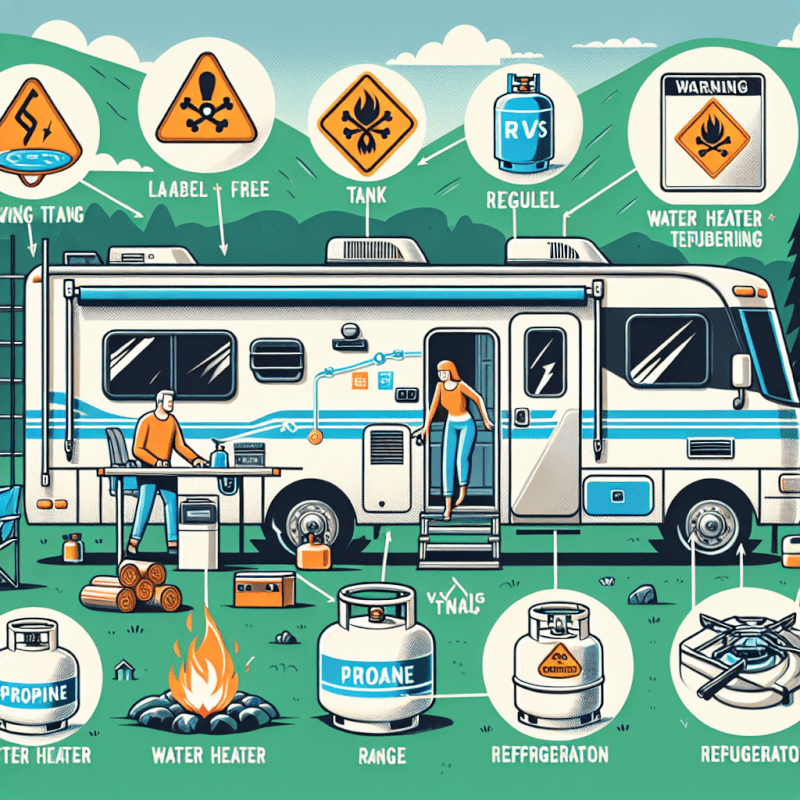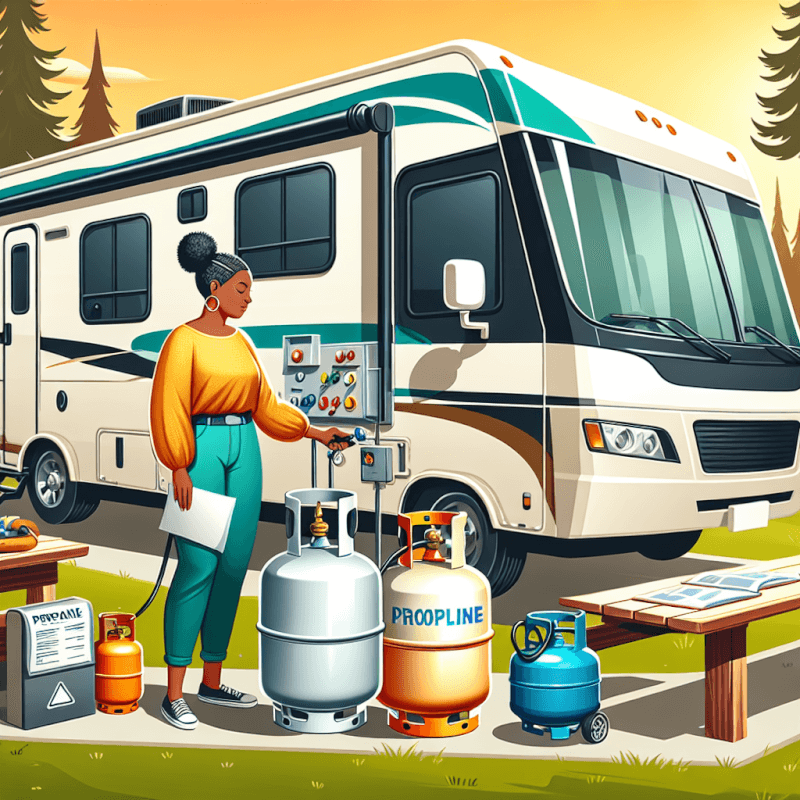Propane is a crucial resource for many RV enthusiasts, providing them with a convenient and efficient way to power their appliances and stay comfortable on the road. However, using propane comes with its fair share of risks. It’s important to take the necessary safety precautions to ensure a safe and enjoyable experience during your travels. In this article, we will explore the key safety measures and tips you need to know when using propane in your RV, helping you to stay protected and worry-free on your next adventure. So, let’s dive into the world of propane safety in your RV!
Propane Basics
Propane is a versatile and efficient fuel commonly used in RVs for various purposes such as heating, cooking, and powering appliances. Understanding the basic properties and characteristics of propane is essential to ensure safe usage. Propane is a flammable gas that is stored in tanks under high pressure. It is odorless and colorless but an odorant, usually ethyl mercaptan, is added to help detect leaks. Propane is heavier than air and tends to sink, so it is important to keep this in mind when considering ventilation and safety measures.
Understanding Propane
Before using propane in your RV, it is crucial to have a good understanding of how the system works. Familiarize yourself with the propane tank, regulator, valves, and appliances that rely on propane. Learn how to properly turn the system on and off, control the flow of propane, and operate the appliances. Take the time to read the RV manual thoroughly as it will provide valuable information on the propane system and safety guidelines specific to your RV model.
Benefits of Using Propane in an RV
There are several benefits to using propane in your RV. Propane is a cost-effective fuel compared to other alternatives. It has a high energy density, meaning it provides more energy per unit than many other fuels. Propane is also readily available at most gas stations and RV parks, making it convenient for refueling. Additionally, propane is a clean-burning fuel that produces fewer emissions, making it a more environmentally friendly option for RV owners.
Pre-Trip Preparation
Before embarking on any RV trip, it is essential to properly inspect and prepare your propane system. This includes checking for any potential leaks, ensuring the propane detectors are in working order, and inspecting the overall condition of the system. By performing these pre-trip checks, you can identify and address any potential issues before they become a safety hazard during your journey.

Inspecting the Propane System
Inspecting the propane system involves thoroughly examining the tanks, regulators, valves, and connections. Look for any signs of physical damage, such as dents or rust, which may compromise the integrity of the system. Check that all valves are functioning properly and ensure there are no loose or leaking connections. It is recommended to have a professional technician conduct a thorough inspection at least once a year to ensure everything is in proper working order.
Checking for Leaks
One of the most important safety precautions when it comes to propane usage is checking for leaks. Even the smallest leak can pose a significant risk, as propane is highly flammable. To check for leaks, mix a solution of soapy water and apply it to all connections and fittings. If bubbles form, it indicates a leak, and immediate action should be taken. Do not attempt to repair leaks yourself; instead, contact a professional to handle the repairs.
Testing Propane Detectors
Propane detectors are crucial in detecting the presence of propane gas in your RV. Regularly test these detectors to ensure they are functioning correctly. Follow the manufacturer’s instructions on how to test the detectors, and replace any defective or expired units. Remember, propane gas is odorless, and the addition of the odorant is what alerts you to its presence. Therefore, well-maintained propane detectors are essential for ensuring your safety.
Proper Propane Tank Handling
Proper handling and storage of propane tanks are vital to prevent accidents and maintain their integrity.

Transporting Propane Tanks
When transporting propane tanks, there are a few important guidelines to follow. Ensure the tank valve is tightly closed and securely fastened. Place the tank in an upright position to prevent any damage to the valve or fittings. It is best to secure the tank in an exterior storage compartment or a well-ventilated area outside of the RV. Never transport a propane tank inside the living area of the RV.
Storing Propane Tanks
Propane tanks should always be stored in an upright position in a well-ventilated area away from any sources of ignition or heat. Avoid storing them in direct sunlight or near flammable materials. Tanks should be stored in a stable and secure manner to prevent them from falling or being damaged. Regularly inspect the tanks for signs of rust or damage, and promptly address any issues to maintain their safety and integrity.
Maintaining Propane Tanks
Regular maintenance of propane tanks is essential to ensure their safe and efficient operation. Check for signs of physical damage, corrosion, or leaks. Avoid using abrasive materials when cleaning tanks, as this can damage the protective coating. If you notice any issues or suspect a problem, contact a qualified technician to inspect and address the situation. Proper maintenance will ensure the longevity and safety of your propane tanks.
Safe Propane Usage
Operating appliances correctly, monitoring propane usage, and avoiding open flames near propane are crucial aspects of safely using propane in your RV.

Operating Appliances Correctly
Always follow the manufacturer’s instructions when operating appliances that rely on propane. Ensure proper ventilation when using propane-powered appliances to prevent a buildup of carbon monoxide. Never use propane-powered appliances for purposes other than their intended use, as this can lead to unsafe conditions. Regularly inspect and maintain your appliances to ensure their safe and efficient operation.
Monitoring Propane Usage
Keeping track of your propane usage is essential to avoid running out of fuel unexpectedly. Many RVs have propane level gauges that provide an estimate of the remaining fuel. Additionally, consider investing in a propane level monitor or wireless sensor system that can provide more accurate readings. Familiarize yourself with the typical propane consumption of your appliances to anticipate when a refill may be needed.
Avoiding Open Flames near Propane
Propane is highly flammable, so it is crucial to avoid open flames or sparks near propane tanks or appliances. This includes smoking, using candles, or operating any ignition sources in close proximity to the fuel. Be cautious when using propane-powered appliances outdoors, especially during windy conditions that could blow the flame and cause a fire hazard. Always exercise caution and prioritize safety when using propane.
Emergency Preparedness
Being prepared for emergencies is essential when using propane in your RV. Familiarize yourself with emergency shut-off procedures and create an emergency kit that includes essential items for your safety and well-being.

Knowing Emergency Shut-Off Procedures
In the event of a propane leak or emergency, it is crucial to know how to shut off the propane supply. Locate the main shut-off valve on your propane tank and understand how to properly operate it. This knowledge will allow you to quickly and effectively shut off the gas supply, minimizing the risk of a dangerous situation.
Creating an Emergency Kit
Prepare an emergency kit that includes essential items such as a first aid kit, flashlight, extra batteries, non-perishable food, water, and a portable phone charger. This kit will provide you with the necessary supplies during an emergency situation. Additionally, consider including a fire extinguisher specifically designed for use on propane fires. Review your emergency kit regularly and replace any expired or damaged items.
Fire Safety
Installing fire extinguishers, knowing how to use them correctly, and maintaining smoke alarms and carbon monoxide detectors are vital aspects of fire safety in an RV.
Installing Fire Extinguishers
Install at least one fire extinguisher in your RV, preferably near the exit for quick and easy access. Make sure the fire extinguisher is suitable for propane fires and that all occupants of the RV know its location. Check the pressure gauge regularly to ensure it is within the recommended range and replace any expired fire extinguishers.

Proper Fire Extinguisher Use
Knowing how to use a fire extinguisher correctly is critical in the event of a fire emergency. Remember the acronym “PASS” – Pull the pin, Aim at the base of the fire, Squeeze the handle, and Sweep from side to side. Practice using a fire extinguisher before an emergency arises to ensure you are comfortable with the process.
Maintaining Smoke Alarms and Carbon Monoxide Detectors
Regularly test and replace the batteries in your RV’s smoke alarms and carbon monoxide detectors. Ensure these devices are functioning correctly before each trip. Clean and dust the detectors regularly to prevent false alarms. In the event of an alarm, promptly investigate and address any potential issues.
Propane System Maintenance
Regular maintenance of your propane system is crucial to ensure its safe and efficient operation.
Regular Inspections and Servicing
Schedule regular inspections and servicing of your propane system by a qualified technician. This includes checking for leaks, inspecting valves and connections, and ensuring the system is operating correctly. Regular maintenance will help identify and address any potential issues before they become major safety concerns.
Cleaning and Securing Gas Lines
Keep your gas lines clean and free from debris or blockages by regularly inspecting and cleaning them. Secure all gas lines properly to prevent any accidental disconnections or damage. If you notice any signs of wear or damage to the gas lines, have them replaced immediately to avoid potential leaks or malfunctions.
Replacing Old or Damaged Components
As your RV ages, certain components of the propane system may need to be replaced. This includes the tanks, regulators, valves, and hoses. If you notice any signs of wear, damage, or malfunction, it is crucial to have these components replaced by a qualified professional. Using old or damaged components can increase the risk of accidents or propane-related incidents.
Educating Yourself
Continuously educating yourself on propane safety and RV-specific guidelines will help you stay informed and make informed decisions.
Reading the RV Manual
Take the time to thoroughly read the RV manual, as it will provide valuable information on the safe operation and maintenance of your propane system. The manual will outline specific safety guidelines and instructions for your RV model.
Seeking Professional Advice
If you have any questions or concerns about propane safety, do not hesitate to seek professional advice. Contact a qualified technician or RV dealership to address any specific concerns or seek guidance on propane-related matters. Professional advice will help ensure you have accurate information and can make informed decisions regarding your propane system.
Personal Safety Practices
In addition to the specific safety measures mentioned, there are several general safety practices to keep in mind when using propane in your RV.
Using Propane in Well-Ventilated Areas
Ensure proper ventilation when using propane in your RV, especially when operating appliances. Open windows, use vent fans, or consider using an RV-specific propane detector that can provide real-time information on propane levels and air quality.
Avoiding Propane Usage near Flammable Materials
Keep propane tanks and appliances away from flammable materials such as gasoline, diesel fuel, paint, or other chemicals. This includes avoiding storage of these materials in close proximity to the propane system. By maintaining distance and proper storage practices, you minimize the risk of accidental fires or explosions.
Keeping Children and Pets Away
Ensure the safety of your children and pets by keeping them away from the propane system and any open flames or heating elements. Educate them about the potential hazards of propane and establish clear boundaries to prevent accidents. Always supervise children and pets around the RV to ensure their safety.
Propane Safety Training
Participating in propane safety courses and training programs can provide valuable knowledge and skills to enhance your safety practices.
Attending Propane Safety Courses
Consider attending propane safety courses or workshops specifically designed for RV owners. These courses provide in-depth information on propane safety, emergency procedures, and best practices for using propane in an RV. By attending these courses, you will gain the knowledge and confidence to handle propane safely.
Understanding Propane Hazards
Understanding the potential hazards associated with propane usage is critical for your safety. Educate yourself on the characteristics of propane gas, the risks associated with leaks or malfunctions, and the proper safety procedures to follow in the event of an emergency. By being aware of the hazards, you can take the necessary precautions to prevent accidents or minimize their impact.
In conclusion, using propane in your RV can provide numerous benefits, but it is crucial to prioritize safety. By understanding propane basics, properly inspecting and maintaining the propane system, following safe usage practices, and being prepared for emergencies, you can enjoy the convenience of propane while ensuring the safety of yourself, your family, and your RV. Regular education, seeking professional advice, and implementing personal safety practices will enhance your overall propane safety knowledge and help create a safe and enjoyable RV experience.


